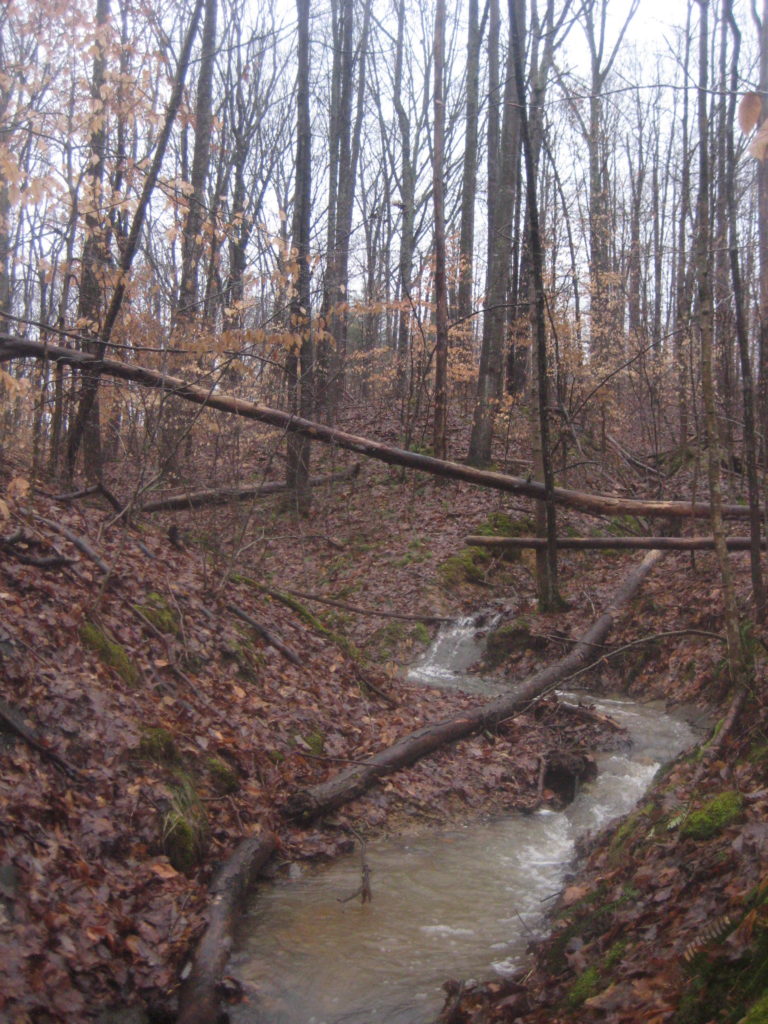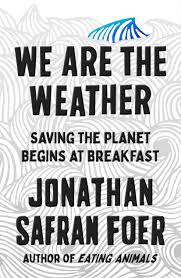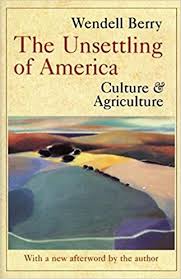If we are heading toward apocalypse, then obviously we must undertake an ordeal of preparation. We must cleanse ourselves of slovenliness, laziness, and waste. We must learn to discipline ourselves, to restrain ourselves, to need less, to care more for the needs of others. We must understand what the health of the earth requires and put that before all other needs. If catastrophic famine is possible, then let us undertake the labors of wisdom and make the necessary sacrifices of luxury and comfort. — Wendell Berry, The Unsettling of America
What is ecological grace if not the sum of daily, hourly decisions to take less than one’s hands can hold, to eat other than what our stomachs most want, to create limits for ourselves so that we all might be able to share in what’s left? – Jonathan Safran Foer, We are the Weather

There are rivers in the driveway that run down the back ravine and into the creek. If the rain ever lets up, I’ll put on my boots and walk down the wooded hills to see how much water is flowing in the ephemeral creek.
Indiana is having a monsoon season – humid air and heavy rain. Our January is confused and we are all scrambling to prepare for a climate that has already changed. It’s a strange time to be alive, a strange time to be settling onto land with the idea that we will grow food here. It’s like entering a relationship with someone in the midst of a psychotic episode who is living a reality you can’t comprehend.

We, like you, have been trying to live ethically in response to climate change. I’ve been reading The Unsettling of America (Wendell Berry) and We Are the Weather (Jonathan Safran Foer). I’ve been watching my friend Amy live out a food ethic that exhausted me at first but now inspires and motivates me. We can all very easily tell ourselves that we are doing enough, but as Berry wrote in 1986, “We must understand what the health of the earth requires and put that before all other needs.” For Jonathan Safran Foer, that comes down to the concrete choice to not eat animal products at breakfast and lunch. Large-scale animal agriculture accounts for between 18-51%* of greenhouse gas emissions. Safran Foer uses this research to argue that the most pragmatic and efficient way to affect climate change is to replace animal products with alternatives, thus cutting emissions and freeing up land to be planted with carbon-absorbing trees. Eating fewer animal products is something everyone can do every day. But it’s hard and most people will continue on with their same habits of consumption because, as Safran Foer notes, “choosing death is more convenient than choosing life….Because short-term pleasure is more seductive than long-term survival.”

So here we are, as the rain continues to fall, the puddles to deepen, our minds to scramble for how to live in these unpredictable times. And here is something we can do that makes a difference.
Our family is making a renewed commitment to the following food choices:
- Dumpster Diving
- Buying from local farmers
- Buying from the local food co-op
The first place we’ll go for food will be the dumpster. This keeps food out of the landfill and saves us money which we can then invest in the local food economy. Dumpster diving also provides us with an abundance of food that we can share with neighbors and use to stock the freezer. An abundance of dumpstered bananas and whole wheat flour** and sugar has been the impetus for a dozen loaves of banana bread already this week. What we can’t consume from the dumpster, we can offer to our compost heap.
If we can’t find what we need (want) in the dumpster, we’ll try to source from local farmers. We recently bought half-a-cow from the Gonso family in Owen County. We split the cost and the meat with two other families. So now we aren’t tempted to buy crappy meat at the grocery store, and we get meat that tastes delicious and is not harmful to the environment. Our hope is to raise animals of our own in the next year and perhaps some of you will enjoy buying meat from us!
Our goal is to stay away from Kroger and Aldi, where we habitually go for cheap food. We’ll go to Bloomingfoods for the rest of our food needs. We can buy in bulk with our own jars and bags. Perhaps the price of local cheese will limit the amount of cheese we have in our diet – as it should. We will find ourselves eating differently.
You’ll notice that we’re not becoming vegetarian or vegan. But we are refusing to buy factory-farmed meat, dairy and eggs. Instead we will eat the surplus from our wasteful capitalist system and support the farmers in our local economy. Not all animal food production is bad for the environment, and some, like rotational grazing, actually helps to sequester carbon in the ground (check out @anathothcatholicworker on Facebook)
This all takes energy, awareness, and effort. Building new habits is challenging. But me and my comfort are not my primary concern anymore. My primary concern is the sustenance of the earth and building my character in such a way that the next generation has the grit to heal our planet, and on and on, each generation with a more finely tuned way of living that protects the sources of all life.
P.S. If you’ve never been dumpster diving, and you’d like to go, shoot me an email and we’ll go out together.
* Safran Foer cites two main research papers, Livestock’s Long Shadow, published by the FOA of the UN and “Livestock and Climate Change: What If the Key Actors in Climate Change are … Cows, Pigs, and Chickens?” published by the Worldwatch Institute and authored by Jeff Anhang and Robert Goodland. The animal agriculture industry is particularly bad for the environment because it compels the majority of the deforestation which eliminates our earth’s capacity to absorb additional carbon. So not only does it emit the worst kinds of greenhouse gases (methane and nitrous oxide) but it prevents those gases from being absorbed. Safran Foer’s book is full of great stories and metaphors along with the hard-hitting facts. He examines why we aren’t acting on the knowledge we have of climate change, taking a close look at how his own beliefs and feelings lead him to resist ethical action.
** Thanks to a sweet friend for the 50lb bag of flour, Ross Dybvig for the 25lb bag of organic sugar, and both of you for your inspirational enthusiasm for dumpster diving.


